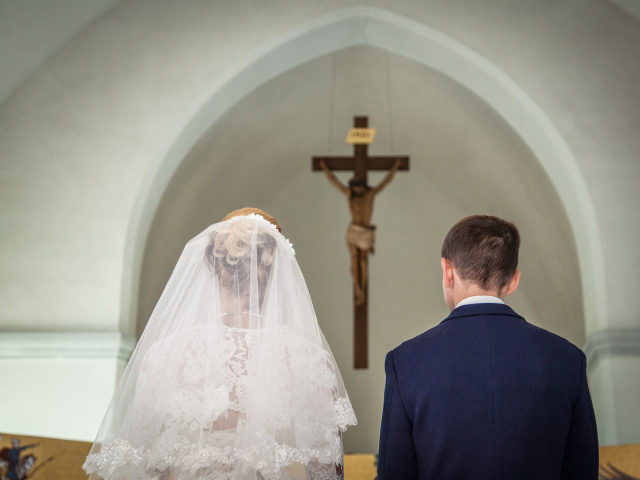Just one in five (21.1 per cent) of traditional, opposite-sex marriages in 2018 were religious ceremonies, the lowest on record, according to the Office for National Statistics (ONS).
The UK’s official statistics body also noted that all marriages for straight couples were at the lowest on record in 2018, continuing the “gradual long-term decline in both numbers and rates since the early 1970s”.
Another trend since the ’70s is for the average age of marriage to be increasing, with the mean age at marriage for straight couples being 38.1 years for men and 35.8 years for women.
Further tears in the traditional social fabric in Britain revealed last year that the fertility rate for women under 30 was at its lowest level since 1938.
While last week, ONS statistics showed that in 2018, one-quarter of all pregnancies in England and Wales ended in abortion.
On the decline of the popularity of religious marriages, the ONS noted that it has “decreased steadily over time. In 1900, religious ceremonies accounted for 84.7% of all marriages; by 1980 this had fallen to 50.4%. Since 1992, civil marriages have increasingly outnumbered religious marriages every year.”
The figures may be unsurprising. 2017 saw that for the first time that people expressing no faith in the UK was more than half of the population, with just 15 per cent considering themselves a member of the Church of England.
The statistical organisation defined “religious marriages” as those which take place in Church of England or Church in Wales premises, buildings certified for marriages that are also registered as places of worship, as well as Jewish marriages and marriages solemnised according to the rites of the Society of Friends, also known as Quakers.
Gay marriage was legalised in 2014 and while religious organisations are protected from legal challenges if they do not wish to marry gay couples, per their faith’s convictions, religious organisations can opt in to performing same-sex marriages.
The ONS noted that 0.9 per cent of same-sex unions were conducted as religious ceremonies. In total, there were 63 religious gay weddings in 2018.
“However, not all religious organisations conduct marriages of same-sex couples,” the ONS noted.
While the Church of England, the seat of the worldwide Anglican communion, forbids people legally of the same sex to marry, the Methodist Church of Great Britain announced last month that “marriage can be between any two people”.
The Methodist Church, which ordained its first transgender vicar in 2017, stated in a resolution which was passed by 254 to 46 against that it “consents in principle to the marriage of same-sex couples on Methodist premises… by Methodist ministers”.
Plans for the two English churches to reunite could be put at risk by the Methodists’ seismic shift to embrace non-Biblical unions; however, the Church of England itself appears confused over the relationship to gender and marriage.
The Church of England does, in fact, allow two people of the same natural birth gender to marry, so long as one has legally changed their identity to the opposite sex, i.e., is transgender.
In 2018 in response to the debate on amending the Gender Recognition Act, the Church of England had reaffirmed in a statement: “Trans people with gender recognition are already able to marry in our churches. Being transgender does not prevent someone offering themselves for ordained ministry and we have transgender clergy as well as laity.”
However, the English church also appears to claim that while it will in one instance accept the state-recognised definition of gender to allow for marriage between two people of legally different genders — even if one is transgender — the church has said it will not challenge a traditional marriage if one person legally transitions to become the same sex as their spouse, making for a same-sex marriage, of sorts.
“If a couple wish to remain married after one partner has transitioned, who are we to put them asunder?” Bishop of Newcastle the Right Reverend Christine Hardman said in 2019.
The church, which has become increasingly progressive in recent years, also called for its schools to allow children to experiment with their gender identity “without judgment”, as well as issuing guidance on how to hold church ceremonies to mark a parishioner’s “gender transition”.
While last month, the Church of England’s first-ever transwoman vicar claimed that “God is non-binary”, similar to Archbishop of Canterbury Justin Welby’s remarks in 2018 that “God is not male or female.”

COMMENTS
Please let us know if you're having issues with commenting.